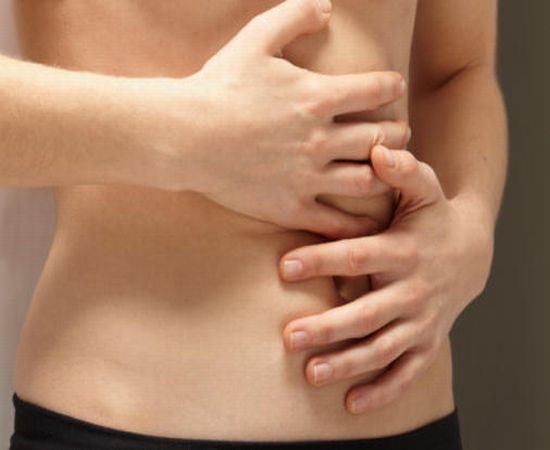Ulcerative colitis is a type of inflammatory bowel disease (IBD). It is the cause of inflammation and ulcers in the inner lining of large intestine, i.e., the colon and the rectum. The ulcers later bleed and produce pus. Ulcerative colitis can affect people of any age and sex. But this condition has mostly been diagnosed in people of age 15–30.
Cause of Ulcerative Colitis
The exact cause of ulcerative colitis is unknown but researchers believe that there are number of factors contributing to it:
1. Genetic factor
Studies have shown that around 16 percent of people with ulcerative colitis have a close family member with ulcerative colitis. Many ethnic groups have been found to be more susceptible to this disease. Researchers have identified certain genes that make people more vulnerable to ulcerative colitis.
2. Immune system response
Some researchers believe that certain viral or bacterial infection trigger our body’s immune system. The immune system responds by causing inflammation of colon, which is not stopped long after the infection goes off. Another theory is the auto immune condition. In this case the immune system mistakes the bacteria naturally present in colon as infection. So it tries to stop the spread of infection causing the inflammation of the colon.
3. Environmental factor
Some of the environmental factors suggested to be responsible for ulcerative colitis are – air pollution, a diet rich in fats and carbohydrates and hygiene.
Symptoms of Ulcerative Colitis
The symptoms of the condition can vary from mild to severe depending on the area of colon infection and the inflammation:
1. Excessive diarrhea where you need to go to the bathroom 10 to 20 times a day. Diarrhea is accompanied by mucus and blood.
2. Abdomen may become sore and painful to touch.
3. Rectal bleeding due to the breaking of ulcers along with pain in the rectum.
4. Loss of appetite and weight loss.
5. Dehydration due to loss of water.
6. Tiredness and fatigue.
7. Anemia or low RBC count due to low iron level as a result of bloody stool.
8. Feeling of tenesmus, i.e., a constant urge to empty the stomach.
9. Fever, joint pain, and eye pain.
10. Constipation may develop but is less common than diarrhea.
Diagnosing Ulcerative Colitis
Ulcerative colitis is not difficult to diagnose because it mostly affects the colon and rectum. Your doctor will perform a number of physical tests like:
1. Colonoscopy
In this the doctor uses a long, flexible tube called a colonscope to examine the entire colon.
2. Sigmoidoscopy
In this the doctor uses a long flexible tube with camera called sigmoidoscope to see inside the rectum and lower part of colon.
3. Abdominal X-ray
This provides an image of the organs of the abdomen.
4. Stool analysis
It is performed to check for signs of blood, bacteria, parasites, and white blood cells (WBC) in stool.
Treatment for Ulcerative Colitis
There are three main types of medicines that are used to control ulcerative colitis, but these should be taken only after consultation with a doctor. These are:
1. Aminosalicylates
This is the first treatment option for mild to severe condition of colitis. It reduces inflammation of the colon. It can be taken in the form of a tablet, capsule or fluid.
2. Steroids
This is for more severe conditions. It also reduces inflammation but more strongly. It can be taken in the form of a tablet, capsule or fluid.
3. Immunosupressants
This is the last option that should be availed. This suppresses the immune system to stop the inflammation of the colon. But the effect is very non-specific as it affects the whole body. In very severe cases of ulcerative colitis the patient need to be admitted to hospital. A new type of medicine called infliximab is given in such situations.
Frequently Asked Questions
1. What are the complications associated with ulcerative colitis?
Ulcerative colitis may lead to many complications like bowel cancer, toxic megacolon, osteoporosis, inflammation, and damage of bile ducts.
2. When should someone opt for surgery inulcerative colitis case?
One should go for surgery when all other treatment options fail and there is an acute chance of acquiring bowel cancer or toxic megacolon.




